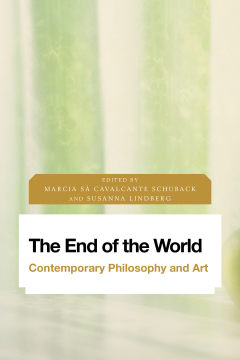
Additional Information
Book Details
Abstract
The 'end of the world' opens up philosophical questions concerning the very notion of the world, which is a fundamental element of all existential, phenomenological and hermeneutical philosophy. Is the 'end of the world' for us 'somebody's' death (the end of 'being-in-the-world') or the extinction of many or of all (the end of the world itself)? Is the erosion of the 'world' a phenomenon that does not in fact affect the notion of the world as a fundamental feature of all existential-ontological inquiry?
This volume examines the present state of these concerns in philosophy, film and literature. It presents a philosophical hermeneutics of the present state of the world and explores the principal questions of the philosophical accounts of the end of the world, such as finality and finitude. It also shows how literature and cinema have ventured to express the end of the world while asking if a consequent expression of the end of the world is also an end of its expression.
The End of the World: Contemporary Philosophy and Art deals with one of the most important narratives of all time, that of the end of the world, and the possibility that it could vanish into time and space without a trace. The contributions each offer a new insight into this possibility, with many fascinating perspectives on this very rich and complex topic.
Peter Trawny, Professor, Martin-Heidegger-Insitute, University of Wuppertal
Marcia Sa Cavalcante Schuback is Professor of Philosophy at Sodertorn University, Sweden. She has published widely in both English and Portuguese, including the Portuguese translation of Heidegger's Being and Time.
Susanna Lindberg is a Core Fellow at the Collegium for Advanced Studies of the University of Helsinki. She is co-editor of Europe Beyond Universalism and Particularism (2014) and the author of several books in French.
Table of Contents
| Section Title | Page | Action | Price |
|---|---|---|---|
| Contents | v | ||
| Introduction | vii | ||
| Part I. THE ENDS IN THE WORLD | 1 | ||
| Ch01. Technologies of the End of the World | 3 | ||
| Ch02. A Conversation on the End of the World | 21 | ||
| Part II. PHILOSOPHIZING THE END OF THE WORLD | 35 | ||
| Ch03. Kant and the End of All Things | 37 | ||
| Ch04. Hegel: The End of History Is Not the End of the World | 53 | ||
| Ch05. End and/or Beginning: The World as One-Time Event in Heidegger and Dōgen | 71 | ||
| Ch06. Putting an End: Derrida and the Death Penalty | 91 | ||
| Part III. AFTER THE END OF THE WORLD | 103 | ||
| Ch07. The End of the World after the End of Finitude | 105 | ||
| Ch08. Expansion of the End: On Friedrich Hölderlin’s Geo-poetics | 125 | ||
| Ch09. Fragments of a Place Called the End of the World | 147 | ||
| Part IV. THINKING FROM THE END | 161 | ||
| Ch10. The Energy of the End | 163 | ||
| Ch11. Every Day, the End of the World | 173 | ||
| Part V. IMAGES AND WORDS OF THE END | 185 | ||
| Ch12. The Ends of the World in Lars von Trier’s Melancholia | 187 | ||
| Ch13. Coming to the End (Günther Anders, Maurice Blanchot) | 201 | ||
| Ch14. The Language of the End and the Language of the World in the Poem of the End by Marina Tsvetaeva | 213 | ||
| Ch15. After the End of the World: Panorama | 235 | ||
| Ch16. Viktor Pelevin’s Postmodern Apocalypsis | 257 | ||
| Ch17. Immersion: Harmony, Variety, and Fragmentation | 271 | ||
| Index | 287 | ||
| About the Authors | 293 |
